Innovation Conference 2021 – Small and medium-sized smart cities and communities
On Thursday, September 23, Halmstad University’s annual innovation conference took place. The conference was arranged by the University’s profile area Smart Cities and Communities. Focus was on development, challenges and possibilities for small and medium-sized cities and communities. To dare and to do were important aspects which were highlighted but also the critical perspective. The keynote speaker Peter Wells, Professor at Cardiff University, feels that smart cities research and policy need a more critical voice.
“To dare to develop, it is important to talk less and ‘play’ more”
Kristina Magnusson, Municipal Director at Ängelholm Municipality
The conference was live-streamed and available for attendees both nationally and internationally. Integrated in the conference was a digital conference room where participants could learn more about the speakers and different topics, ask questions, and mingle with each other during breaks. They could also discuss current issues during the conference, for example what opportunities are there to create smart cities in our regional environment and ideas for collaboration in the future.
The first section of the Innovation Conference 2021 was focused on challenges for small and medium-sized smart cities and communities. The speaker Åsa Minoz, Innovation Strategist at Viable Cities, talked about how nine Swedish cities and four authorities already have signed a climate contract for this, and over 20 cities will in total sign this coming fall.
“Our mission is climate neutral cities 2030, and it is not only about limiting carbon emission but also to do that with a good life for all inhabitants”, said Åsa Minoz.
“Viable cities inspire others. For example, Spanish cities have taken lots of inspiration from us and we look forward to work together with Spanish organisations and other international partners”, she also said in her speech.
Historical perspectives on the smart city
Magnus Jensner, Museum Director at Hallands Konstmuseum, gave a historical perspective in his talk From Halmstad to Stockholm – local ideas brought to center stage on city development. He did this by showing the development of Sergels torg and its surroundings in Stockholm in the late 1960s. Many behind the development were from Halmstad. This was during a time when many cities made big changes to adapt to traffic and this was also the case for Sergels torg. Today, the traffic has been more or less removed from the area again and the tram, which was considered an old-fashioned means of transport in the 1960s, is yet again passing the square on its way to Djurgården.
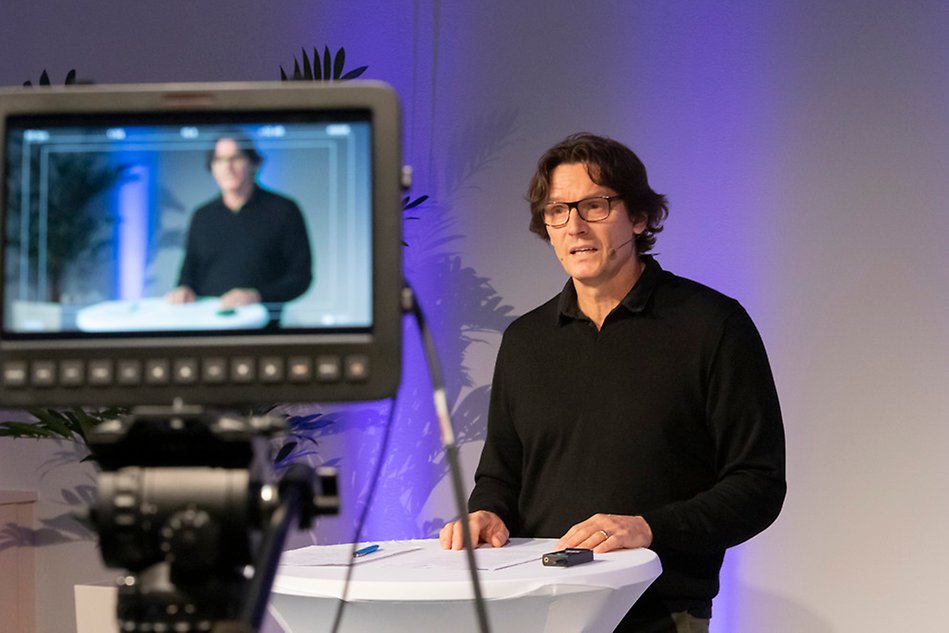
Speaker Magnus Jensner quoted Sarah Pink, keynote speaker during the Innovation Conference 2019, when she was asked to define a smart city: “A smart city has to be continuously evolving, together with the people living in it”.
“Important to work together like a competing bicycle team”
The following focus of the conference was the collaborative environment in the region from a local perspective. Anders Nelson, Deputy Vice-Chancellor at Halmstad University, introduced and led the panel discussion about issues such as: how do we create collaboration with all the complex challenges in a city or community? And how do smaller cities or companies position themself, for example, to find finances for the work?
“Most Europeans live in cities of the size of Varberg and Halmstad”, stated Erik Behm, Establishing Strategist at Invest in Halland, Region Halland, who was one of the panelists.
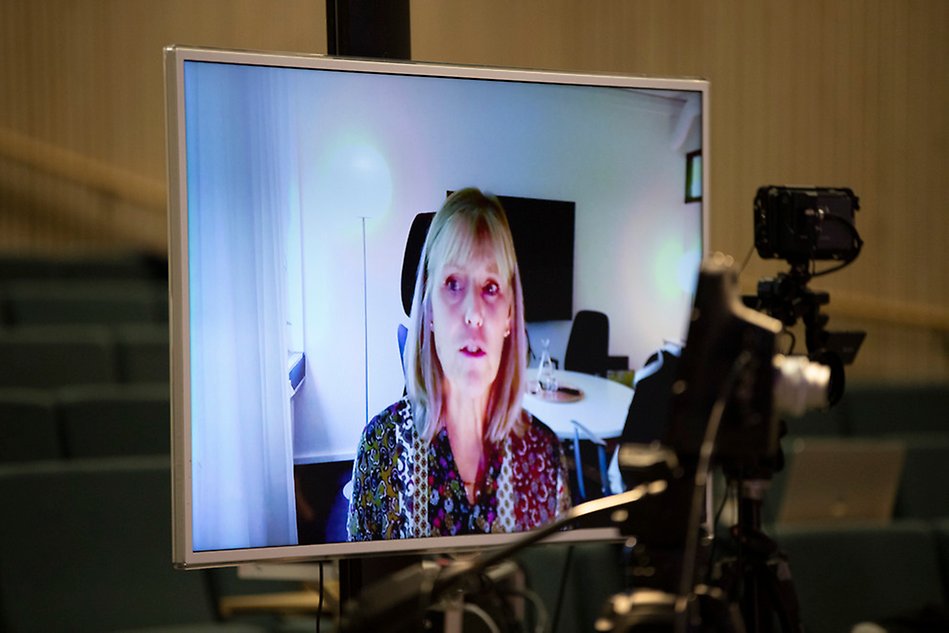
Kristina Magnusson talked about “dare, test and do”: “It is important to take the step and dare to test. It might not always be good, but the journey is sometimes to the most important part of development, not the final goal”.
Voices from the panel discussion
Kristina Magnusson, Municipal Director at Ängelholm Municipality:
“I have learnt how to dare, to let go, to test and to try and do different things. To dare to develop, it is important to talk less and ‘play’ more”. Our biggest challenge is to take the very first step.”
“We need an organisation that cooperates and lives as it learns. And brave coworkers who dare to test. I like to work with people who challenge me when me myself get scared.”
Erik Behm, Establishing Strategist at Invest in Halland, Region Halland:
“How do we find the cases that are equally interesting from different parts of society? We have round table conversations, we meet with people and try and see what we can find in “the soil, the mill” of Halland.”
“With many different partners, it is important to work together like a competing bicycle team: we take turns in taking the lead and cycle at the front of the group and encourage the others, but we are always a team.”
Max Wehlin, Infrastructure and Research Analyst at Varberg Municipality:
“Do not underestimate challenges. When we were about to introduce a self-driving bus, the local discussion became focused on that there would be less space for parking. But once we got the bus running, we could discuss the bus itself with the residents of Varberg. It is important to consider that not all smart solutions are common or natural for people. We can never have just a technology focus, we need to think about human needs and the human basis. We always take in response from the outside, we have an ongoing conversation within the whole of the municipality, that is the key.”
People central in the development of smart cities
The third section of the day dealt with initiatives enabling sustainable societies. Magnus Jonsson, Programme Manager and Kristian Widén, Deputy Programme Manager for the profile area Smart Cities and Communities at Halmstad University, gave an overview of the profile area Smart Cities and Communities at Halmstad University.
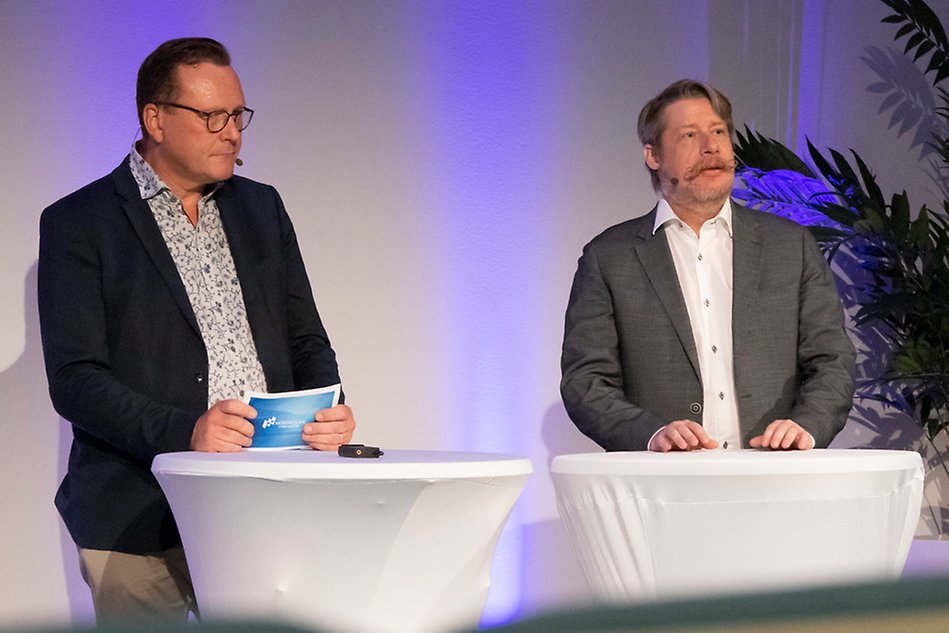
Magnus Jonsson and Kristian Widén introduced the profile area Smart Cities and Communities (SCC) at Halmstad University: “We are primarily focusing on small and medium-sized cities and communities. The profile area is built on a strong tradition of cooperation with partners, both public and private, and we have a multidisciplinary approach”.
The project AHA II: Co-Designing Future Mobility in Urban Living Labs in Gothenburg and Helsingborg puts a very human approach on developing future mobility solutions. The project involves two cities and two living labs, Drottninghög in Helsingborg and Bergum Gunnilse outside Gothenburg.
A goal with AHA is to innovate ways to engage communities and people in the design of urban mobility solutions.
“The innovation model has a human-centred agenda to invite people to co-create solutions with as and this an example of an ethnographic living lab”, said Vaike Fors, Professor of Design Ethnography at Halmstad University.
Different needs require different solutions
Next on the agenda was Smart Village Veberöd, a collaboration project with FabLab at Halmstad University. Jan Malmgren, Entrepreneur and CEO at Byutveckling AB at Veberöd says that Veberöd is a research village for a sustainable society and the first Nordic FabCity.
He says that they always start their projects with analysing what needs that exist in the community and that these needs differ a lot between small villages compared to cities.
“We asked farmers what their needs were, and one farmer said she needed a system to tell when the water for the cows was out. Then we helped develop a system with sensors and an alarm. During the summer we had some really thirsty cows because the alarm went off several times”, he said, and continued:
“Students come to Veberöd to use it as a playground, to test and learn. One group of students built sensors that measure how much swings are used, and if cars are driving too fast”.
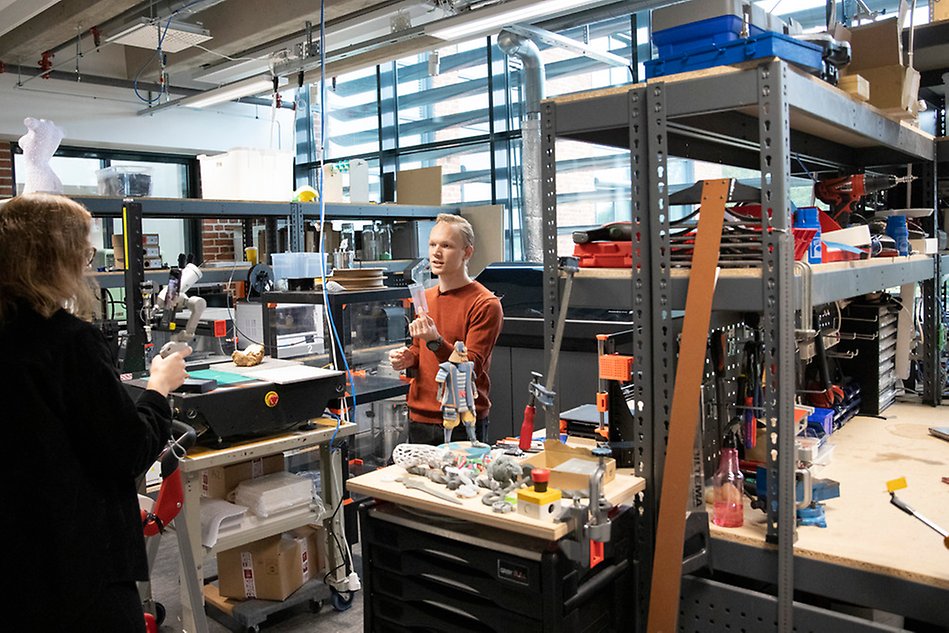
Tim Malmgren gave a digital tour of FabLab. “FabLab is all about creating multidisciplinary competence. That is where the magic happens”.
“Beside smart villages, we also founded a youth organisation. We have a small creek where we wanted to measure pollution and let the children and teenagers help. They do this for their own future”, says Tim Malmgren, Research Engineer at Halmstad University and also a former student at the University.
“In order to make progress tomorrow, we have to start yesterday”
The last part of the Innovation Conference the local to international perspective was highlighted with examples of research and development. The keynote speaker, Peter Wells, Professor of Business and Sustainability and Director, Centre for Automotive Industry Research, Cardiff University talked about organisational innovation for smart cities. He said that BMI (Business Model Innovation) enables smart city development and smart cities enable BMI.
He also asked the question of whether the consumer side of this is as great as it seems?
“There are too many choices in consumption. It is not free of problems. We are all in danger of becoming people who live in the precariat”, said Peter Wells.
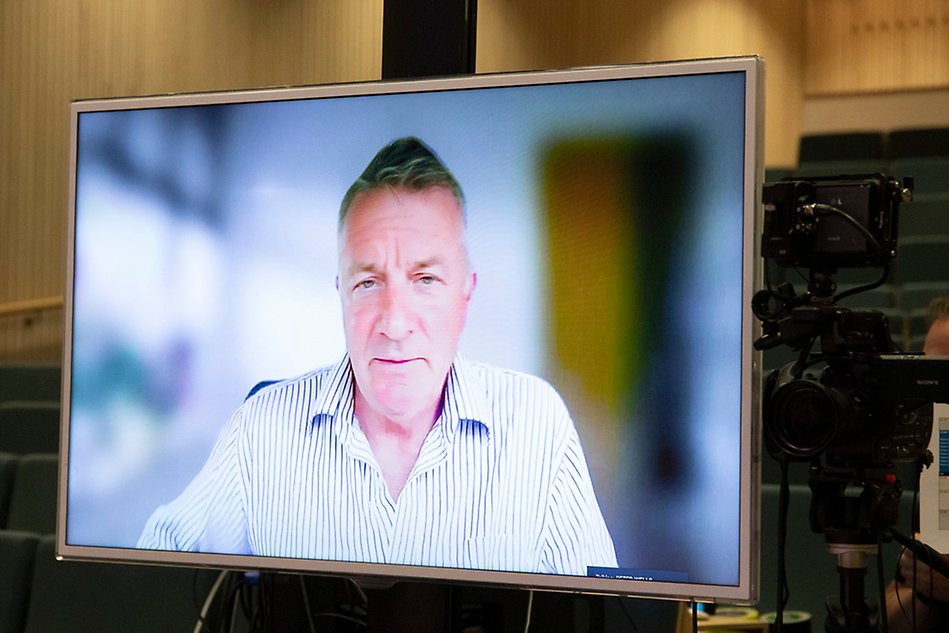
“Smart cities research and policy need a more critical voice. We have a duty with our own work and our research to consider what happens to the people exploited when we develop smart cities. Are we creating a new underclass? Or maybe a new super-elite with very fabulously wealthy few?” said Peter Wells.
Pontus Wärnestål, Senior Lecturer, Halmstad University and Design Director at inUse, gave the days’ last talk about The Future History of Travel: Forecasting Mobility Services through Research and Prototyping.
“We are not trying to predict what the future will look like, but we are looking into plausible futures. We call it forecast instead of prediction. We are trying to forecast future scenarios and problems. When we talk about possible futures, we can turn around and look at what we have done before. In order to make progress tomorrow, we have to start yesterday”, said Pontus Wärnestål.
Great need for highlighting small and medium-sized cities
After the conference, Magnus Jonsson, Kristian Widén, Programme Directors at SCC, Halmstad University, and Stella Erlandsson, coordinator, expressed that their plan to have a good mix and a variety of speakers had been successful.
“It was very apparent from the speakers that there is a big need to focus on small and medium-sized cities in the area of smart cities and communities”, said Magnus Jonsson and added together with Stella Erlandsson:
“Another take from the conference, not least from the panel discussion, is the importance of daring to test and try things without necessarily being 100 percent certain that you will actually succeed. But daring and trying without success is also a form of development.”
Text: Kristina Rörström, Linnéa Andersson and Anna-Frida Agardson
Photo: Dan Bergmark
Contact
-
Programme Manager profile area Smart Cities and Communities
-
Deputy Manager profile area Smart Cities and Communities
-
Coordinator

